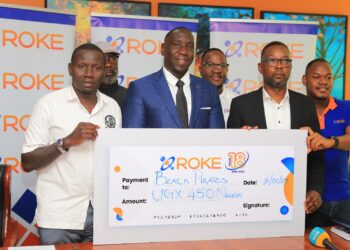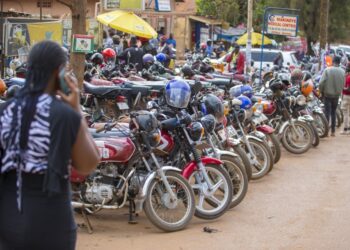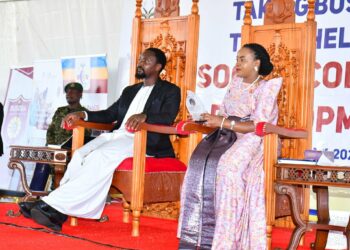When President Yoweri Museveni set terms for politicians’ involvement in the Covid19 interventions, including donation and distribution of food and other relief items, he set the stage for suffocating his political opposition, drowning their voices to amplify his, binning alternative ideas to show all and sundry that his government was in charge.
Unlike veteran defiant opposition leader Dr Kizza Besigye, political novice Robert Kyagulanyi aka Bobi Wine obeyed Museveni’s new directives on food donation, ordering his newly appointed deputy Dr Lina Zedriga Waru Abuku to deliver food items to the Covid19 National Taskforce. Some members of Besigye’s camp, who refused to hand over the food items and ambulances and have reportedly continued to covertly distribute food to the vulnerable poor, have been criticising Bobi for giving food to a government which has struggled to distribute the items to hungry city dwellers.
With Museveni threatening to charge politicians with attempted murder and to throw them in prison if they flout his directives, the struggle for political relevance started. From songs on Coronavirus to media interviews once in a while, Bobi Wine, who is eyeing the country’s top seat in next year’s general elections, fought for his space on the table of those with something to offer in preventing the further spread of the disease.
It wasn’t too long before racist attacks on blacks in China made global headlines. Bobi Wine jumped into the fray, claiming to offer a solution, and eyeing an opportunity to position himself as an African statesman.
“Africans in parts of China in pain. Many Ugandans forced onto streets calling for help. We condemn the targeted attacks and call upon Chinese authorities to urgently intervene. I also challenge home governments to engage the government of China or quickly repatriate these people,” said Bobi Wine on April 11, in response to news of racist harassment meted on Africans in China.
Laying bare his unawareness on how nations handle issues of repatriation, Bobi attempted to use social media following and his traction to tell Kampala and Beijing what to do. However, other analysts say the Kyadondo East MP – or at least his advisors – was aware of how foreign policy works, but this was not time to keep quiet, but rather speak and appeal to Ugandans at home and abroad, and be seen as caring and tough enough to force governments to act to his whims.
Even when Museveni told Foreign Affairs Minister Sam Kutesa to handle the matter through available diplomatic channels, Bobi was not done pushing. In fact, hours after the attacks were reported (on the same day Bobi told Africa to push China to force citizens to treat blacks better), Kutesa met Chinese Ambassador to Uganda Zheng Zhuqiang in a morning meeting in Kampala.
In the meeting, Kutesa “conveyed the serious concern of the Government of Uganda on the harassment and mistreatment of its citizens” and asked Beijing to “urgently intervene and address the plight of Ugandans in China.” And Zhuqiang reiterated China’s commitment to ensuring that the issues are addressed so that they don’t hurt Uganda-China relations. Bobi Wine’s critics argue that by pushing Kampala to act outside such diplomatic forums would not only come with consequences for relations but exposed the People Power pressure group leader’s ignorance of foreign policy were he in such a position that would place on him the responsibility to make international diplomacy decisions.
During his address on April 14, Museveni addressed the issue of Ugandans stuck in China. The President said that while he would advise that those in China stay there until Covid19 has been defeated, and as Kampala and Beijing discuss ways of stopping harassment of black people, he would discuss available options with the Foreign Affairs Ministry.
But not willing to give up his pursuit of Pan-Africanist clout, Bobi went ahead and wrote to Prime Minister Ruhakana Rugunda asking government to agree to host Ugandans “and other African brothers and sisters stuck in parts of China.” Normally, Bobi Wine’s proposal would require communication between Kampala on one side, and Beijing and governments of countries of these people’s origin, on the other. Ultimately, bodies like the African Union (AU) and International Organization for Migration (IOM) would be involved.
On the cost of evacuation, Bobi told Rugunda that he and Atlanta Black Star publication CEO Neil Nelson had put together “resources to airlift some of the most pressed people from China to a country willing to receive them.” This would ideally require government to confirm that indeed the money was available. Furthermore, Kampala and Washington would also go as far as investigating the source of Bobi’s and Nelson’s money, especially given the former’s links to alleged foreign elements that government is suspicious of.
What Kyagulanyi sought was relevance because a statement from Kutesa or a rebuke from Museveni would make national headlines and break the monotony of Covid19 statements from the Ministry of Health and security agencies, stung critics, predicting that a ‘back-off’ comment from Henry Okello Oryem, the State Minister for Foreign Affairs, should have shaken Bobi from his reverie of exaggerated political importance.
Politically speaking, foretelling government response to the People Power leader’s request didn’t require a prophet. Kyagulanyi knew this but his advisors told him he would lose nothing by taking a gamble on the matter for which he might win hearts of some gullible followers, further argue his critics. Bobi’s detractors also claim that the MP’s camp thought that the push for repatriation of Africans to Ugandan soil would expose Museveni and his government as lacking in Pan-Africanism, too broke to repatriate citizens suffering abroad and uncaring – as opposed to Bobi Wine who was willing to use his “wide network of wealthy friends scattered all over the world” to help both nationals and sons and daughters of Africa. In the end, critics concluded, Bobi would be seen as “Savior of Uganda and Africa,” something he would keep emphasizing on his campaign rallies ahead of the 2021 presidential election.
On the whole, as Besigye said last month, Covid19 is political because “politics decides who gets [what] and who doesn’t get it.” From distribution of food, voluntary donations, presidential addresses, supplementary budget allocations to suggestions for repatriation of those stuck abroad, everyone engaged seems to be plotting to score a political point. And like all humans, Bobi Wine is a political animal – to borrow Aristotle’s words – only that most people seeking political office are not expected to be ordinary political animals.
Do you have a story in your community or an opinion to share with us: Email us at editorial@watchdoguganda.com












